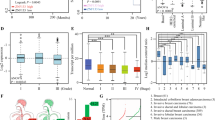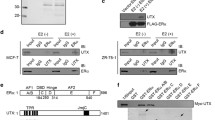Abstract
Zinc-finger enhancer binding protein (ZEB1) is a transcription factor involved in the progression of cancer primarily through promoting epithelial to mesenchymal transition (EMT). ZEB1 represses the expression of E-cadherin by binding to E-box sequences in the promoter, thus decreasing epithelial differentiation. We show that ZEB1 and androgen receptor (AR) cross-talk in triple negative breast cancer cell lines. Chromatin immunoprecipitation analysis demonstrates that ZEB1 binds directly to the E-box located in the AR promoter. ZEB1 suppression by stably transfecting shRNA in a triple negative breast cancer cell line resulted in a decrease of AR mRNA, protein, and AR downstream targets. ZEB1 knockdown in triple negative breast cancer cells sensitized the cells to bicalutamide by reducing migration compared to the control cells. Conversely, blockade of AR signaling with bicalutamide resulted in a suppression of ZEB1 protein expression in two triple negative breast cancer cell lines. Furthermore, using a breast cancer tissue microarray, a majority of triple negative breast cancers exhibit positive staining for both ZEB1 and AR. Taken together, these results indicate that ZEB1 and AR regulate each other to promote cell migration in triple negative breast cancer cells.






Similar content being viewed by others
References
Brys M, Wojcik M, Makowska H, Krajewska W (2002) Androgen receptor status in female breast cancer: RT-PCR and western blot studies. J Cancer Res Clin Oncol 128:85–90
Davidson N, Lippman M (1989) The role of estrogens in growth regulation of breast cancer. Crit Rev Oncog 1:89–111
Platet N, Cathiard A, Gleizes M, Garcia M (2004) Estrogens and their receptors in breast cancer progression: a dual role in cancer proliferation and invasion. Crit Rev Oncol Hematol 51:55–67
Howell A, Cuzick J, Baum M, Buzdar A, Dowsett M, Forbes JF et al (2005) Results of the ATAC (arimidex, tamoxifen, alone or in combination) trial after completion of 5 years of adjuvant treatment for breast cancer. Lancet 365:60–62
Isola J (1993) Immunohistochemical demonstration of androgen receptor in breast cancer and its relationship to other prognostic factors. J Pathol 170:31–35
Diaz-Chico B, Rodriguez F, Gonzalez A, Ramirez R, Bilbao C et al (2007) Androgens and androgen receptors in breast cancer. Steroid Biochem Mol Biol 105:1–15
Birrell S, Hall R, Tilley W (1998) Role of androgen receptor in human breast cancer. J Mammary Gland Biol Neoplasia 3:95–103
Zhu X, Li H, Liu JP, Funder JW (1999) Androgen stimulates mitogen-activated protein kinase in human breast cancer cells. Mol Cell Endocrinol 152:199–206
Birrell SN, Bentel JM, Hickey TE, Ricciardelli C, Weger MA, Horsfall DJ, Tilley WD (1995) Androgens induced divergent proliferative responses in human breast cancer cell lines. J Steroid Biochem Mol Biol 52:459–467
Doane AS, Danso M, Lal P, Donaton M, Zhang L, Hudis C, Gerald W et al (2006) An estrogen receptor-negative breast cancer subset characterized by a hormonally regulated transcriptional program and response to androgen. Oncogene 25:3994–4008
Wong YC, Xie B (2001) The role of androgens I mammary carcinogenesis. Ital J Anat Embryol 106:111–115
Boccuzzi G, Tamagno E, Brignardello E et al (1995) Growth inhibition of DMBA-induced rat mammary carcinomas by the antiandrogen flutamide. J Cancer Res Clin Oncol 121:150–154
Naderi A, Hughes-Davies L (2008) A functionally significant cross-talk between androgen receptor and ErbB2 pathways in estrogen receptor negative breast cancer. Neoplasia 10:542–548
Eger A, Aigner K, Sonderegger S et al (2005) Delta EF1 is a transcriptional repressor of E-cadherin and regulates epithelial plasticity in breast cancer cells. Oncogene 24:2375–2385
Ohira T, Gemmill R, Ferguson K et al (2003) WNT7a induces E-cadherin in lung cancer cells. PNAS 100:10429–10434
Spaderna S, Schmalhofer O, Hlubek F, Berx G, Eger A, Merkel S et al (2006) A transient, EMT-linked loss of basement membranes indicates metastasis and poor survival in colorectal cancer. Gastroenterology 131:830–840
Vincent-Salomon A, Theiry JP (2003) Epithelial-mesenchymal transition in breast cancer development. Breast Cancer Res 5:101–106
Chua H, Bhat-Nakshatri P, Clare S, Morimiya A, Badve S, Nakshatri H (2007) NF-κB represses E-cadherin expression and enhances epithelial to mesenchymal transition of mammary epithelial cells: potential involvement of ZEB1 and ZEB2. Oncogene 26:711–724
Graham TR, Zhau H, Odero-Marah V, Osunkoya A, Kimbro K et al (2008) Insulin-like growth factor-I-dependent upregulation of ZEB1 drives epithelial to mesenchymal transition in human prostate cancer cells. Cancer Res 68:2479–2488
Postigo A, Dean D (1997) ZEB, a vertebrate homolog of Drosophila Zfh-1, is a negative regulator of muscle differentiation. EMBO J 16:3935–3943
Spaderna S, Schmalhofer O, Wahlbuhl M, Dimmler A, Bauer K et al (2008) The transcriptional repressor ZEB1 promotes metastasis and loss of cell polarity in cancer. Cancer Res 68:537–544
Spoelstra N, Manning N, Higashi Y, Darling D, Singh M, Shroyer K et al (2006) The transcription factor ZEB1 is aberrantly expressed in aggressive uterine cancers. Cancer Res 66:3893–3902
Hope I, Mahadevan S, Struhl K (1998) Structural and functional characterization of the short acidic transcriptional activation domain of yeast GCN4 protein. Nature 333:635–640
Seipel K, Georgiev O, Schaffner W (1992) Different activation domains stimulate transcription from remote (“enhancer”) and proximal (“promoter”) positions. EMBO J 11:4961–4968
Aigner K, Dampier B, Descovich L et al (2007) The transcription factor ZEB1 (δEF1) promotes tumour cell dedifferentiation by repressing master regulators of epithelial polarity. Oncogene 26:1–10
Wang F, Sloss C, Zhang X, Lee SW, Cusack J (2007) Membrane-bound heparin-binding epidermal growth factor like growth factor regulates E-cadherin expression in pancreatic carcinoma cells. Cancer Res 67:8486–8493
Sharma D, Fondell JD. (2002) Ordered recruitment of histone acetyltransferases and the TRAP/mediator complex to thyroid hormone-responsive promoters in vivo. Proc Natl Acad Sci 99:7394–7399
Hall R, Clements J, Birrell S, Tilley W (1998) Prostate-specific antigen and gross cystic disease fluid protein-15 are co-expressed in androgen receptor-positive breast tumours. Br J Cancer 78:360–365
DiMonaco M, Brignardello E, Leonardi L, Gatto V, Bocuzzi G (1995) Inhibitory effect of hydroxyflutamide plus tamoxifen on oestradiol-induced growth of MCF-7 breast cancer cells. J Cancer Res Clin Oncol 121:710–714
Richer J, Jacobsen B, Manning N, Abel M, Wolf D, Horwitz K (2002) Differential gene regulation by the two progesterone receptor isoforms in human breast cancer cells. J Biol Chem 277:5209–5218
Chamberlain EM, Sanders MM (1999) Identification of the novel player deltaEF1 in estrogen transcriptional cascades. Mol Cell Biol 19:3600–3609
Singh M, Spoelstra N, Jean A, Howe E, Torkko K, Clark H, Darling D, Shroyer K, Horwitz K, Broaddus R, Richer J (2008) ZEB1 expression in type I vs type II endometrial cancers: a marker of aggressive disease. Mod Pathol 21:1–12
Dillner N, Sanders M (2004) Transcriptional activation by the zinc-finger homeodomain protein delta EF1 in estrogen signaling cascades. DNA Cell Biol 23:25–34
Lazarova DL, Bordonaro M, Sartorelli AC (2001) Transcriptional regulation of the vitamin D3 receptor gene by ZEB. Cell Growth Differ 12:319–326
Sekido R, Murai K, Funashashi J, Kamachi Y, Fujisawa A (1997) Two mechanisms in the action of repressor δEF1: binding site competition with an activator and active repression. Genes Cells 2:771–783
Anose B, LaGoo L, Schwendinger J (2008) Characterization of androgen regulation of ZEB and PSA in 22RV1 prostate cancer cells. Adv Exp Med Biol 617:541–546
Acknowledgments
This work was supported by the Wilbur and Hilda Glenn Foundation (R. O’Regan); Georgia Cancer Coalition (R. O’Regan); National Cancer Institute Center of Cancer Nanotechnology Excellence CA119338 (R. O’Regan); BC-030963 DOD CDMRP, BCRP (D. Sharma); BCTR-0503526 Susan G Komen for the Cure (D. Sharma).
Author information
Authors and Affiliations
Corresponding author
Rights and permissions
About this article
Cite this article
Graham, T.R., Yacoub, R., Taliaferro-Smith, L. et al. Reciprocal regulation of ZEB1 and AR in triple negative breast cancer cells. Breast Cancer Res Treat 123, 139–147 (2010). https://doi.org/10.1007/s10549-009-0623-7
Received:
Accepted:
Published:
Issue Date:
DOI: https://doi.org/10.1007/s10549-009-0623-7




